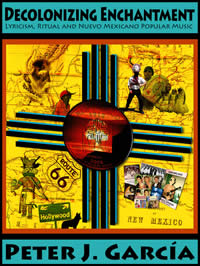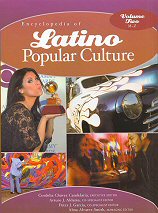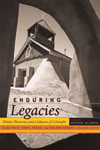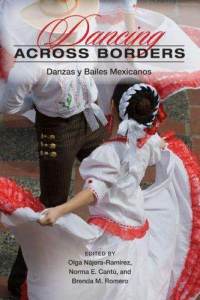Peter J Garcia
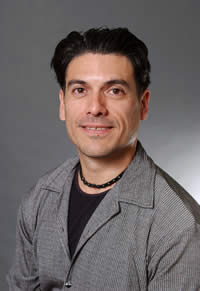
Credentials
Curriculum Vitae
Dr. Peter J. García completed his Ph.D in Latin American ethnomusicology at the University of Texas at Austin 2001 with a research specialization in Southwest Borderlands music-cultures including Native-American, Chicana/o, Anglo-American, Afro-American, and "new mestizo" immigrant and indigenous communities. His dissertation supervisor was the late Gerard Behague and he also studied with ethnomusicologist Manuel Peña, anthropologist Pauline Strong, and ethnomusicologist Steve Slawek.
García's research interests and teaching include World Cultures and Music, Latin American Musics, Aesthetics, and Cultures, U.S. Indo-Hispano, Chicano, Afro-mestizo, Latin/o and Southwest Mexicana/o folk, classical, popular and protest musics including indigenous sacred dancing. García's publications engage decolonial theory, third world feminism, ritual and diaspora studies, borderlands "new mestiza/o" (differential) consciousness and musical activism, gender/sexuality and queer studies, semiotics, music (auto) -ethnography, the political economy of music, critical pedagogy and global/local perspectives on music.
Dr. García arrived on campus in Spring 2007 and was recently promoted to tenured Associate Professor in 2011. His monograph Decolonizing Enchantment: Echoes of Nuevo Mexicano Popular Musics is forthcoming from the University of New Mexico Press in Fall 2011 and is included in the Paso Por Aqui Series on the Nuevomexicano Literary Heritage. This book is a multi-sited ethnographic, oral historical, and at times reflexive investigation of the dialectic of struggle and change in transnational Southwestern Borderlands and U.S. Latina/o music-cultures. This work also features photographs by award winning photographer Miguel Gandert and Echoes an accompanying critical recording of New Mexico music by Enrique Lamadrid.
García was awarded a Fulbright García-Robles grant to complete ethnographic resesarch on the annual peregrinacion (pilgrimage) in Magdalena de Kino (Sonora) beginning in the Summer 2006. Throughout the fellowship, he was in residence at the Universidad de Sonora (Hermosillo) where he lectured and performed music concerts on campus during the Fall 2006.
His earlier field research on a Nuevomexicano or Indo-Hispano ritual dance known as la danza de los matachines, was published in 2009 in an edited volume titled Dancing Across Borders: Danzas y Bailes Mexicanos, co-edited by Olga Najera-Ramirez, Norma Cantú, and Brenda Romero. Oral historical research on Colorado borderlands singer Michelle Lobato examines Chicana grounded aesthetics, and was published as a book chapter called “Ay Que Lindo es Colorado” in Hidden Legacies/ Enduring Struggles: Ethnic Histories and Cultural Survival in Colorado (2010) edited by Arturo Aldama and Elisa Facio. García co-authored another forthcoming article with Enrique Lamadrid titled: "Performing Indigeneity in the Nuevo Mexicano Homeland: Antiguo Mestizo Ritual and New Mestizo Revivals, Antidotes to Enchantment and Alienation" which will be included in: Comparative Indigeneities of the Americas edited by Arturo J. Aldama, M. Bianet Castellanos, and Lourdes Gutiérrez Nájera.
García also served as co-editor for another volume with Drs. Arturo Aldama and Chela Sandoval, which will also be forthcoming next year. Performing the U.S. Latina and Latino Borderlands challenges readers to engage the profound intercultural psychic, social, and transnational effects generated by U.S. Latina and Latino performance, from testimonio, music, dance, spoken-word, ritual, story-telling, teatro, improvisation, call-and-response, nagualismo and fashion to visual, body, digital and sculptural enactments. Each contributing author introduces readers to performance topics enlivened through a Borderlands Performance Studies method the editors identify as “de-colonizing performatics.” Although Latina/os in the U.S. represent the largest growing community after “non-Hispanic “ Whites, there exists a serious gap in information about Latin@/Chican@ and Indigenous cultural practices and identities. Contributors seek to rectify that lacuna in this thoroughly interdisciplinary volume that boasts established leaders and rising stars from cultural, visual and performance studies, folklore and ethnomusicology. Essays focus on performances generated out of Latin@/Chican@/Indigenous communities throughout the U.S. and intersect various transdisciplines including Latin@/Chican@, Latin American, American, ethnic, womens/gender, media, and queer studies programs and pedagogies.
Since his appointment to the Department of Chicana and Chicano Studies in 2006, García continues teaching MUS310 Understanding World Cultures through Music and hopes to teach MUS307 Music From a Global Perspective for the CSUN Music Department. He was also selected to lead an Honors Section of MUS310 during the Fall 2011. García is also a concert and Latin jazz saxophonist, mariachi guitarist/vocalist, and regularly performs Chicana/o solo folk music from Mexico and the Southwest Borderlands. García is currently faculty advisor and co-director of the Mexican (Latin/o) Music Ensemble- a student performing and composition group that explores various forms of Latina/o musical styles and genres through original musical arrangements, compositions, and improvisation providing concerts on and off campus for the local Latina/o and Chicana/o communities. The group also performs for on-campus events and concerts in the Music and Chicana/o Studies departments, and as part of campus outreach to local area high schools.
In addition to serving as faculty advisor and co-director of the CSUN Mexican (Latin/o) Music Ensemble, García also plays saxophone, clarinet, and guitar in the group. The ensemble debuted at the annual on-campus "Dia de los Muertos" (November, 2010) and "End-Dependence" (September, 2010) day festivals, and for an on-campus Memorial service and procession for departed Professor Karen Duran (November, 2010). We also performed "Misa Hispana" by Mary Francis Reza and an entire instrumental set for the wedding sevice and reception of Luis Rodriguez and Elizabeth Gutierrez at Our Lady of Lourdes Catholic Church on April 16, 2011. The music ensemble is also busy playing various cultural events and concerts including graduation celebrations, birthday parties or "las Mañanitas", and Mother and Father Day occasions. We are preparing to perform on the World Music Ensemble concert in the Music Department this Fall and have also been invited to play for the College of Humanities graduation ceremonies for Spring 2012 by Dean Elizabeth Say.
García also co-edited the Arizona Biopower issue of the peer-reviewed on-line journal Bad Subjects: Political Education for Everyday Life providing insight into state sponsored biopower in the Arizona-México borderlands. When Arizona is brought up many scholars, educational and immigration rights activists across the U.S. just shrug and say “Arizona is crazy” or ”that is Arizona for you”. After leaving our academic appointments at Arizona State University as a means of protesting the ongoing anti-Latino/immigrant and official state sponsered thugery, both editors (Arturo Aldama and myself) strongly believe that Arizona is a bas-relief to a matrix of racialized biopower that seeks to criminalize and denigrate subjects based on fear driven paranoia about indigenous and mestiza/o peoples. We sincerely hope that this issue of Bad Subjects will make a positive difference in highlighting the racism, violence, and anti-immigrant hysteria coming out of Arizona today and point out the role that higher education has played in the copy-cat anti-Latino laws spreading across the nation.
http://bad.eserver.org/
http://bad.eserver.org/issues/2011/81
During the Summer 2011, Dr. García was selected to participate in a Summer Institute "Ethnomusicology and Global Culture" June 21-July 2, 2011 at the Music Department at Wesleyan University in Middletown, Connecticut. The Summer Institute provided García a wonderful opportunity to “re-think” and “re-theorize” his ongoing investigtaion based on field research on the Fiesta de San Francisco in Magdalena de Kino begun in 2007 under the Fulbright Garcia-Robles Granteeship to Mexico. My initial investigation analyzes the methodological implications within multi-sited ethnography and transnational ritualized peregrinación (pilgrimages). Engaging critical theory presented in Su Zheng’s book: Claiming Diaspora: Music, Transnationalism, and Cultural Politics in Asian/Chinese America, I wish to engage diaspora as part of a larger ritual system illustrating Mexican, Native (Pima/Papago and Yaqui) Indian and Mexican American spirituality and heritage exploring how ritual, pilgrimage, and festival mediate present social and political challenges over the border, immigration and how music and aesthetics express structures of feelings, memories and kinship, and regional heritage. Music in this way helps communities recuperate previous attachments to occupied homeland at the same time mediating imperialist nostalgia, linguistic terrorism, and displacement of cultural citizenship and dislocation of indigenous community. While at Wesleyan, García also developed a special section of MUS 307 (Music From A Global Perspective): Ethnographies of Film Music, Musical Scoring Techniques, Movie Soundtracks, and Global Cinematic Systems. This course explores global soundtracks, scoring techniques, and film history using approaches from ethnomusicology, cultural studies, and film criticism. Students will develop critical thinking and listening skills approaching movie soundtracks as film ethnographies.
Principal Faculty:
Eric Charry (Institute Director), Mark Slobin, Su Zheng, Wesleyan University
Guest Lecturers:
Melvin Butler, Peter Hadley, Maureen Mahon, Maria Mendonça, Alex Perullo, Sumarsam
The Society for Ethnomusicology and the Wesleyan University Music Department are pleased to collaborate for a National Endowment for the Humanities Summer Institute in ethnomusicology. We will provide stipend support for the participation of twenty-two faculty from universities, four-year colleges, and community colleges, and three full-time graduate students. Three principal faculty from Wesleyan and six guest lecturers will lead the daily sessions over the course of two weeks.
What happens when music, people, and media move across the globe? What kinds of transformations take place? How has recent technology facilitated such transformations? These are some of the key questions that will challenge us as we look at case studies from around the world, introducing the selected NEH Summer Scholars to new and recent scholarship and developing teaching strategies for incorporating this focus into the curricula of both music and related humanities disciplines.
Dr. Garcia is also co-editor of one of the foundational reference textbooks on popular culture that is utilized in Latin American and U.S. Latina/o studies. The Greenwood Encyclopedia of Latino Popular Culture was released in October 2004. This two volume academic reference tool is designed to provide general research based information on a variety of Latina and Latino popular culture topics and issues that have influenced North American culture.
He enjoys swimming, weight-lifting, reading, traveling and cooking.
